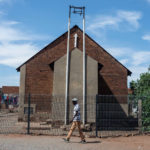Service delivery buckles in Sasolburg
A coalition fractured by conflicting political ideologies at Metsimaholo local municipality in Sasolburg, northern Free State, has left residents without adequate service delivery and desperate for…
Author:
4 September 2018

Sasolburg, which contributes more than 33% to the GDP of Free State, is bruised by collapsing infrastructure, mushrooming tin shanties, impoverishment and unemployment.
The battle for control of the municipality has ensued since the 2016 local elections, when the ANC failed to secure a majority, leading to a coalition between opposition parties.
Infighting between coalition leaders – the Democratic Alliance (DA), the Economic Freedom Fighters (EFF) and the Metsimaholo Community Association (MCA) led to the collapse of the coalition in May 2017, forcing a by-election in November.
Without an outright winner during the by-election, the South African Communist Party (SACP), which strayed from party tradition by contesting against its tripartite alliance partners, was tasked by opposition parties to lead the municipality.
The by-election resulted in the ANC winning 16 seats, the DA winning 11 seats, the EFF winning eight seats and the SACP winning three seats. The MCA, Freedom Front Plus, Forum 4 Service Delivery and the African Independent Congress each won a single seat.
Petty squabbles
Disgruntled residents living in the many tin shanties on the outskirts of town told New Frame that political uncertainty in the district might lead to another shutdown over service delivery and access to land.
Diketso Maduna, 43, a resident at the Iraq settlement, accused the SACP-led coalition of focusing on petty political squabbles instead of serving its constituents. “We want land and services. Without land we do not have dignity,” he says.
Maduna is one of thousands of shack dwellers who have been living in the large and growing settlement for more than 17 years. According to him, the residents of the settlement, who live mostly in tiny shacks, are subjected to living in close proximity to human waste and rubbish.
Related article:
Like many others in the settlement, Maduna moved to Sasolburg to find work to support his family of six. But unemployment rates are devastatingly high in the area. Many of the people moving to the area from rural Free State in search of better opportunities do not find work.
According to Maduna, the area is often flooded during rainy seasons and is ravaged by fires when the dry, cold winters set in. As such, inadequate service delivery leaves residents particularly vulnerable. “Political instability has led to service delivery interruptions and no one wants to account,” he says.
When community members have complaints about service delivery, Maduna says they are shuffled by municipal officials from one political party to another. To counter this, he says residents “will bring Metsimaholo to its knees”, and that “another shutdown is brewing”.
The Metsimaholo local municipality administers three mayoral towns: Sasolburg, which is the municipal head office; Oranjeville; and Deneysville, with an estimated 37 320 households.
Under administration
In June, municipal councillors endorsed the municipal budget to avert 2017’s political stalemate. But this only prompted the Free State provincial government to put the municipality under administration after the municipality failed to approve the municipal budget, bringing service delivery to a standstill.
Mathousand Mahlatsi, who has been living in the nearby Smoorspot shack settlement for more than 12 years, says the community has repeatedly requested land sites with no success. “My biggest fear is dying in this shanty,” he says.
Both shack settlements only have one communal tap each, which serve more than 3 000 inhabitants, respectively. The settlements have slanted pit toilets made of concrete sheets and cardboard.
Related article:
Monica Motloung, the mother of 8-year-old Bonolo, told New Frame that living in constant squalor, coupled with the pollution emitted by nearby refineries and heavy industry, has badly affected her daughter’s health. She says human waste and a lack of proper sanitation is the root cause of the poor health suffered by the many sickly children in her community.
Citing a neglected local stadium, Maduna alleges corruption and abuse of state resources by municipal officials. According to him, millions of rands that were allocated for the upkeep of the stadium were looted.
Residents say the crisis actually began in 2013, when the government attempted to incorporate Metsimaholo into the Ngwathe municipality. The merger was abandoned after residents torched Metsimaholo municipality, looting and destroying key buildings in the area.
Ongoing looting
Sello Hlasa, the former mayor of Metsimaholo and the former leader of the MCA, told New Frame that the battle for control of the municipality has led to the demise of the municipality. According to him, municipal coffers are still being looted. “That coalition is not holding. They have forgotten about their electoral mandate,” he says. Hlasa lost his mayoral seat after the first coalition failed.
Lindiwe Tshongwe, the current mayor and SACP leader in Metsimaholo, wants to strengthen and support cooperatives, and ensure that local public works helps to rebuild public infrastructure.
Related article:
With a budget of more than R1.2 billion for the 2018/19 financial year, Tshongwe says that as “land has become the topical issue in our country”, the municipality has “identified sites for residential purposes”.
According to Tshongwe, the following sites have been identified for residential purposes:
– 300 approved stands in Zamdela
– 140 stands in Vaalpark
– 2 980 stands for mixed development for Mooidraai township
– 700 stands for Sasolburg Ext. 58
– and 60 serviced sites in Orangeville
Metsimaholo municipality spokesperson Gino Alberts told New Frame that delivering services to its constituents is a key priority but did not comment on alleged teething problems in the coalition.
Alberts says the authority is not aware of any allegations of corruption levelled against the municipality and urged residents to report corruption to the relevant law enforcement bodies. “We are not aware that political instability is hampering service delivery,” he says, adding that the municipality has budgeted R1.2 billion to address housing and land challenges.



